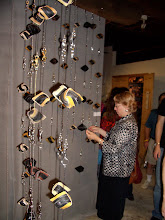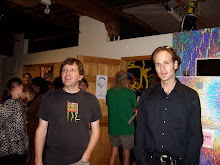enter the treadknot
Welcome
On September 26th, 2006, I launched my tire art/design business, Reptire Designs, with a solo exhibition of my artwork in The Green Gallery at The Scrap Exchange Center for Creative Reuse, in Durham, NC. For many reasons, it was a night that I will always remember, and I am grateful to Laxmi (my girlfriend at the time) and Edie (my mother, still) for dutifully documenting while I shmoozed, so that I may now shmare a taste of the evening with anyone who was not able to attend...
On a cool but lively autumn night-before-Center Fest, a stream of friends and curious strangers trickled (like pebbles through a rain stick) through the forest of odds and ends (that roost at night in The Scrap Exchange), out into the warm light of the back savanna, a scene utterly glopped with bizarre rubbery hybrids. Tentative and curious, the visitors craned their necks, nibbled, pecked, stood back, moved in closer. From the walls, glassy mirror eyes gazed back through black unblinking eyelids, while beneath the visitor's feet, in a steamy drainage cistern, a mortal drama unfolded. Primordial forms, with no eyes at all, sat puckered on stoops. A cascade of glittering steal droplets formed a curtain, to which clung a colony of tiny tire knotlettes.
By the end of the night, hundreds of friends, acquaintances and had-been-strangers had poured in, poured over the work, and partaken in, what was for me and my art, a monumental communal feast. And on top of it all, I got to place many of my preemies in hands that I love and trust, and in several instances, hands that fit them like gloves. What a privilage to be able to connect with people this way. Heading into the turbid seas of small business, I can confidently say that if I drown tomorrow, I am at least blessed today with the memory of (as Vito later put it) one authentically good Durham night.
Thanks to all of you who were there; in body and/or spirit.
On September 26th, 2006, I launched my tire art/design business, Reptire Designs, with a solo exhibition of my artwork in The Green Gallery at The Scrap Exchange Center for Creative Reuse, in Durham, NC. For many reasons, it was a night that I will always remember, and I am grateful to Laxmi (my girlfriend at the time) and Edie (my mother, still) for dutifully documenting while I shmoozed, so that I may now shmare a taste of the evening with anyone who was not able to attend...
On a cool but lively autumn night-before-Center Fest, a stream of friends and curious strangers trickled (like pebbles through a rain stick) through the forest of odds and ends (that roost at night in The Scrap Exchange), out into the warm light of the back savanna, a scene utterly glopped with bizarre rubbery hybrids. Tentative and curious, the visitors craned their necks, nibbled, pecked, stood back, moved in closer. From the walls, glassy mirror eyes gazed back through black unblinking eyelids, while beneath the visitor's feet, in a steamy drainage cistern, a mortal drama unfolded. Primordial forms, with no eyes at all, sat puckered on stoops. A cascade of glittering steal droplets formed a curtain, to which clung a colony of tiny tire knotlettes.
Vito D., a long-time collabator down from the Asheville area, caressed the warming air with his Strange Little Folk music. I bobbed and I flit, and at an increasing clip-someone must have opened the faucet a bit....for soon I was swooning, I just about lost it! As the evening progressed, to my delight and amazement, 'family' from Durham, Chapel Hill, Pittsboro, Hillsboro, Siler City, Asheville, and Fresno all made it! From the Cohn Clan to the Steudel Clan to the CFS Clan; from the WWC Clan to the Duke Ac Pub Clan to the SAF Clan; from the Bike Shop Clan to the Ninth St. Clan to the Scrap Clan... and every one in between, guys, they were all appearing before my stunned, blinking eyes. While I spun and I splayed, Vito now played-CHURNED- up a torrent of gritty ditties; while a staff volunteer (Brandon's a photographer, I swear) whipped up pitchers of Mango Lassies. And The 'Scrap Exchange girls' worked the door, the counter, and the floor, going "cha-CHING!", cha-CHING!","cha-CHING!".!.
By the end of the night, hundreds of friends, acquaintances and had-been-strangers had poured in, poured over the work, and partaken in, what was for me and my art, a monumental communal feast. And on top of it all, I got to place many of my preemies in hands that I love and trust, and in several instances, hands that fit them like gloves. What a privilage to be able to connect with people this way. Heading into the turbid seas of small business, I can confidently say that if I drown tomorrow, I am at least blessed today with the memory of (as Vito later put it) one authentically good Durham night.
Thanks to all of you who were there; in body and/or spirit.
Reclaimed-wood Builder and Reptire Collector Howard Staab enjoying magwi knot at the Scrap Exchange
I can't think of anything more rewarding for an artist than to see someone interacting with their artwork. Photo by Laxmi Haynes
Sammy and Dannette contemplate
Photograph by Laxmi Haynes
Cascade Colony of Knotlets

They would go with your jacket, would they not Claire?
Laxmi Resplendent

Mavis In The Mist
Photograph by Laxmi Haynes
Tire Amazement

Photograph by Edie Cohn
Sunday, July 14, 2013
"AUTOPIA"
Autopia
I
just recently stumbled upon a great, big, fascinating book at our local
library, entitled Autopia.
The
book takes a sweeping look at the place and influence of the automobile on
human culture, from a variety perspectives, both within American culture, and
also in other cultures around the world. Literature, Economics, Popular Music,
Urban Planning were just a few of the angles discussed.
THE AUTOMOBILE AND THE VISUAL ARTS
Of
course, one of the chapters that I was most curious about was the influence
that the Automobile has had on the Visual Arts, as well as the influence that
the visual arts have had on the automobile. Indeed, from the automobile’s
conception, there has been an intimate and reciprocal relationship between the
visual arts and the automobile, that of course continues to this day.
ORIGINS OF THE AUTOMOBILE
It might be telling that the first sketches of such a motion
machine are found in the sketchbooks of none other than Leonardo Di Vinci.
Then?
Futurists- grabbed onto idea, raw energy of speed. Some good
paintings came out, that appeal to my eye. Serpentine.
However,
the main thrust of frenzy that the Futurists were tapping into has led to one
of recent histories sadder chapters. Futurism carried over into Fascism.
Nazism. Carnage.
It is quite telling that Hitler (as the author reports) was
a great admirer of Henry Ford.
For indeed, one could darkly posit (yet correctly, I think),
that the holocost was in essence an industrialized pogrom.
As the poisonous dusts of war cleared, and the world began
to reexamine itself, the next
generation of artists to pick up on these ideas stirred up by the automobile
looked at them from a slightly different angle. Far less frenzied, but still with
plenty of energy, and more curiosity, Artists such as Marcel Duchamp began to
dissect the automobile, in much the same way, the author points out, as the
Renaissance artists of Di Vinci’s time took to dissecting the human body.
Of
course, it wasn’t so much the automobile’s parts that they were dissecting, as
the experience of velocity that the automobile afforded. Such cool and graceful
dissections as Duchamp’s Nude Descending A Staircase stand out against the rash
brutality of many of the Futurists expressions, however, such a painting does
resonate I find with some of
Giacomo Balla’s paintings (such as Abstract Speed, 1913), in their
mesmerization with rhythm, frequency and form.
And
of course, this novel, dizzying, and somewhat fragmented experience of seeing
the world in fast forward was a major interest of, and influence on the Cubists
(which I was supprised that the Author did not mention).
One
thing that I was amused to see mentioned was a comparison by the Futurists, of
classical architecture to the automobile, which they proudly touted as far
superior to the former. This immediately called to my mind a photograph that I
recently took while on a visit to Central Europe, to explore my Jewish family
roots, as well as the European cultures that they had been feeding for the past
several centuries.
One
of my very first experiences of Germany was stumbling across an antique car
show in Cologne. There, in row upon row layed out before that fair city’s
graceful Gothic Cathedral, a milleu of proud car owners, and other fanatics had
assembled to worship their idols of design and speed. “Clearly, the Germans
worship the auto” I poked at several of the German bystanders I met there, who
all nodded in sheepish agreement.
“Not only that; they touch their cars more than they do
their wives” muttered an attractive woman, whose husband was busily buffing a
head lamp.
So, I must ask myself. If there is a long tradition, and
relationship between the visual arts and the auto, where does the artwork made
from tires that Reptire Designs creates fit in to this long tradtion or story?
Ironically, I can’t say that I personally identify very much
with the Futurists, at least the Futurists of their own time.
Well before I was born, their Futurist ‘Future’ had already
become my family’s ‘History’. And it was not one that we had the privilage to
revel in; for it was our people, like many others, who were squashed beneath
Fascism’s frenetic, ravenous wheels.
Also ironically, as the author points out, many of the
Futurists themselves ended up dying on the front at their own proverbial wheel.
I do admire Balla’s painting, and I am curious to learn more
about his series.
Ultimately, this leads to one important aspect of the
automobile that I did not see directly referred to in the book, the
relationship of the automobile to wildlife, specially those creature who find
their life cycles disrupted, and often terminated on our highways.
Poem about dead possum.
Road kill- my own fascination with it.
The holocost.
Tire Art. A way of reclaiming the tire?..
Box Turtle, in decline. Davidson University.
Do I feel compelled to pull a slain animal off of the road,
because I am of Jewish heritage?


